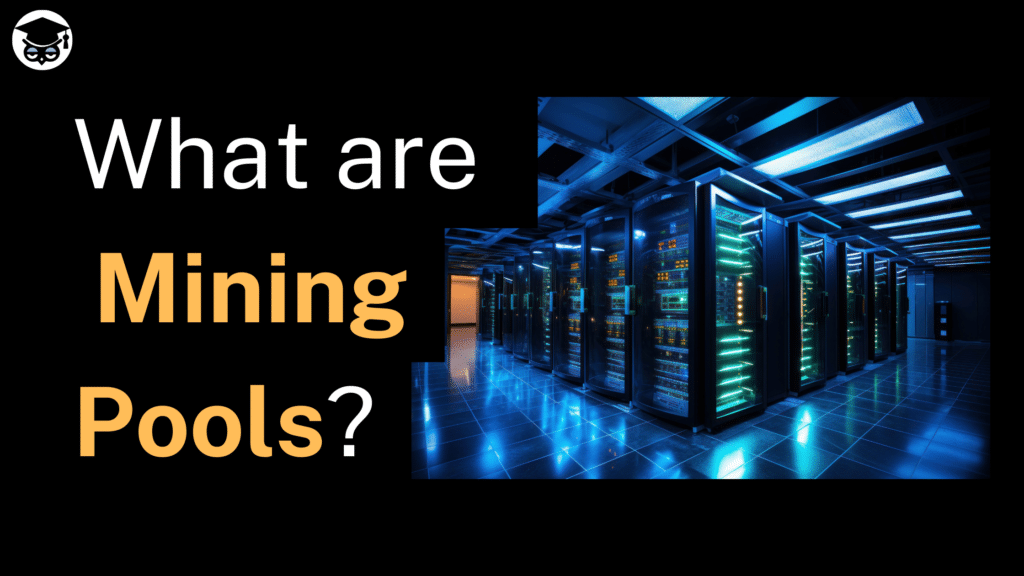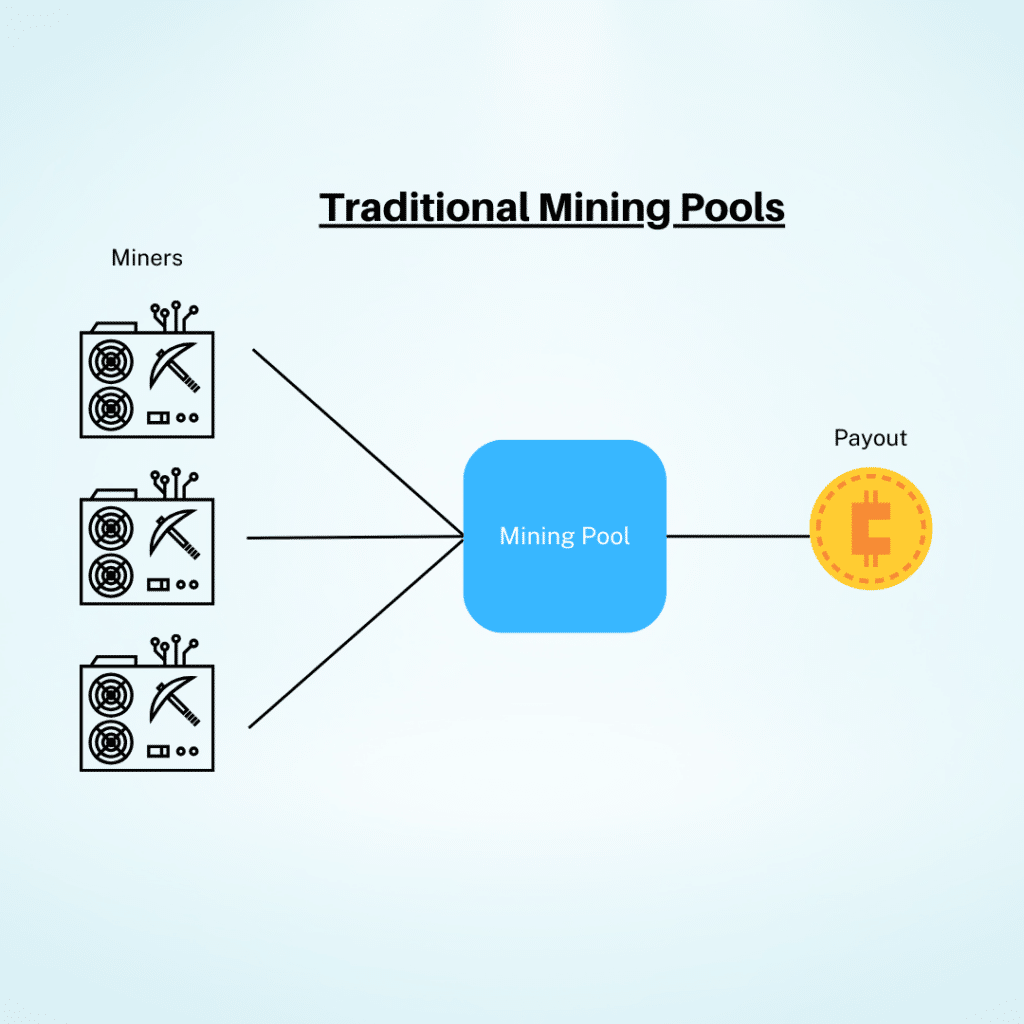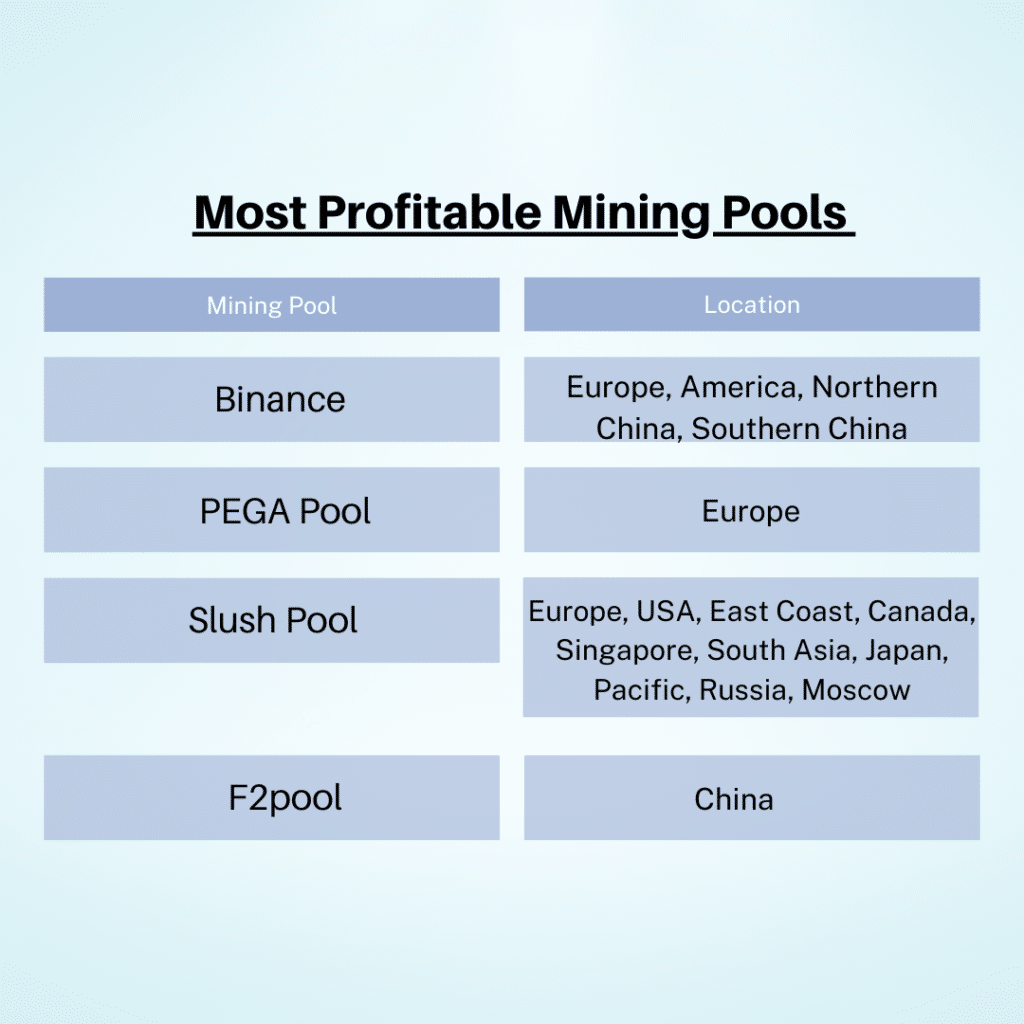What is a Mining Pool?
Mining is a process of verifying cryptocurrency transactions to generate new coins and keep the networks secure and running smoothly.A mining pool is a group of cryptocurrency miners who combine their computing power to increase their chances of verifying a block of transactions and receiving a reward.
The Longer Definition
Cryptocurrency miners make money by solving complex problems to earn cryptocurrency, such as Bitcoin, and to complete the work of verifying transactions on a blockchain. This can be a complicated process, but there is a way to make it easier– join a mining pool.
When miners join a mining pool, they share their computing power and split the rewards instead of competing with each other to verify a block of transactions. This allows each miner to get a more consistent reward since the mining pool can verify more blocks of transactions.
A mining pool is managed by a pool operator, who sets up the mining pool and maintains it. The pool operator is responsible for distributing the rewards to the miners in the pool. The miners in the pool also must pay a fee to the pool operator.

How Do Mining Pools Work?
Mining pools work by combining the computing power of all the miners working within the project. When a block of transactions is verified, the reward is split among all the miners in the pool, according to their contribution.
The pool operator sets up the pool and sets the rules for how the rewards are distributed. This includes setting the fees for the pool operator, and how rewards are split among the miners.
The pool operator also sets up the software and hardware needed to run the mining pool. This includes setting up mining hardware, mining software, and the pool website.
Examples of Mining Pool companies include Slush Pool, F2Pool, AntPool, ViaBTC, BTC.com, Poolin. Genesis Mining and Bitfury.
When a miner wants to join a pool, they will first have to register on the pool’s website. Once registered, the miner will be able to access the pool’s software and hardware and start mining.
History of Mining Pools
Mining pools have been around since the early days of Bitcoin. The first mining pool was launched by Slush Pool in November 2010. Since then, mining pools have become increasingly popular. Today, there are hundreds of mining pools available for miners to choose from.
Mining pools have become an important part of the cryptocurrency ecosystem. They provide miners with an easier and more efficient way to mine, as well as a more consistent reward.

Advantages of Mining Pools
These include:
- Increased mining speed: By joining a mining pool, miners can increase their mining speed and generate more rewards.
- Consistent rewards: Mining pools allow miners to get a more consistent reward since the mining pool is able to verify more blocks of transactions.
- Lower fees: Mining pools generally have lower fees than solo mining, since the fees are shared among the miners in the pool.
- Lower difficulty: Mining pools generally are less difficult than solo mining, since the difficulty is shared among the miners in the pool.
Disadvantages of Mining Pools
These include:
- Lower rewards: Mining pools generally have lower rewards than solo mining because the rewards are shared among the miners in the pool.
- Security risks: Mining pools can be vulnerable to malicious actors. For example, if a malicious actor gets access to the pool operator’s account, they could steal the rewards from the miners in the pool.
- Centralization: Mining pools can increase the centralization of the cryptocurrency network, as a few pools can control a significant part of the network.
Popular Mining Pools
There are many popular mining pools available for miners to choose from. Some of the most popular pools include Antpool, BTC.com, F2Pool, and Slush Pool.
Each pool has different rules and fees, so miners should make sure to do their research before joining a pool.

Common Problems with Mining Pools
These include:
- Low hash rate: which means lower rewards.
- High fees: which can reduce miners’ profits.
- Poor customer service
Is Joining a Mining Pool Profitable?
Yes, joining a mining pool can be profitable. However, miners should do their research before joining a pool, as each pool has different rules and fees. Miners should also consider the cost of hardware and electricity when determining if joining a mining pool is profitable.
Resources for Joining a Mining Pool
There are many resources available for miners looking to join a mining pool. Some popular resources include comparison websites, reviews, and forums.
Mining pool comparison websites provide detailed information about different pools, such as fees, hash rate, and rewards. Mining pool reviews provide feedback from other miners who have used the pool. And mining pool forums provide a platform for miners to discuss their experiences with different pools.
Mining Pool Fees
Fees vary from pool to pool, but they can range from 0% to 5%.

Calculating the Profitability of Mining Pools
The profitability of a mining pool depends on several factors, such as the pool’s hash rate, fees, rewards, and difficulty.
Mining profitability calculators take into account the pool’s hash rate, fees, rewards, and difficulty in determining the expected profits.
Strategies for Optimizing Mining Pool Profitability
These include:
- Joining multiple pools
- Choosing the right option: with a low fee, high hash rate, and substantial rewards.
- Optimizing hardware: Miners should make sure to optimize their mining hardware to get the most out of their mining rigs.
Security Considerations with Mining Pools
Mining pools can be vulnerable to malicious actors. Miners should take security precautions when joining a mining pool, such as using two-factor authentication and not sharing their passwords with anyone.
Miners should also make sure to choose a pool that is secure and reliable.
Alternatives to Mining Pools
Mining pools are not the only way to mine cryptocurrencies. Miners can also mine solo or join a cloud mining service.
Solo mining is a good option for miners who have access to powerful mining hardware and low-cost electricity. Cloud mining is a good option for miners who don’t have access to powerful mining hardware or low-cost electricity.
Want to join the Dypto journey? Follow our socials!